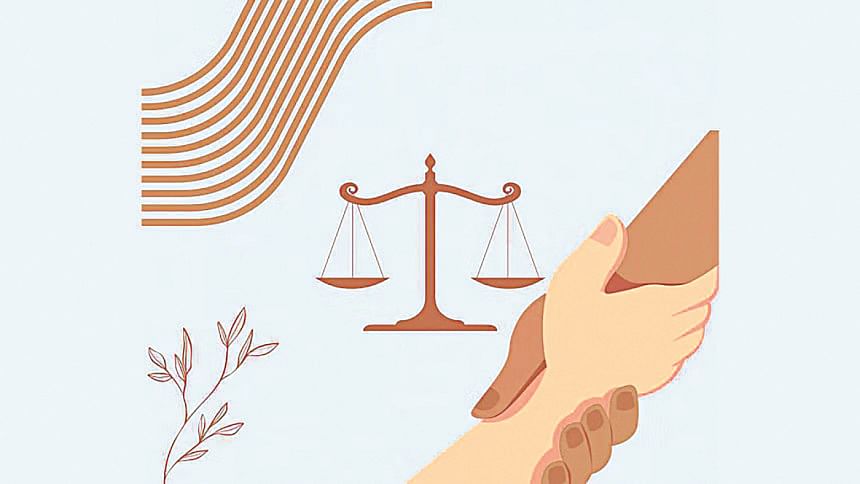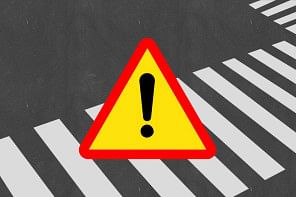Legal aid, systemic barriers, and access to justice in Bangladesh

Access to justice is not only a fundamental right but also a cornerstone of a fair and democratic society. It ensures that every individual, regardless of their socio-economic background, can seek remedies for grievances, claim their rights, and participate in legal processes. In Bangladesh, while the Constitution guarantees equality before the law, the reality is starkly different for millions of people who are unable to navigate the justice system due to financial, procedural, and systemic barriers.
Legal aid is designed to bridge this gap by providing free or subsidised legal assistance to those who cannot afford legal representation. In Bangladesh, legal aid is provided through the Legal Aid Services Act 2000, which led to the creation of the National Legal Aid Services Organisation (NLASO) and district-level legal aid offices. These institutions are responsible for administering legal aid to indigent litigants by covering court fees, providing legal representation, and facilitating access to justice. However, despite these provisions, the legal aid system remains underutilised and often fails to reach those who need it the most in our country.
Recently, the interim government of Bangladesh has undertaken reforms across all sectors, including the judiciary. The Judicial Reform Committee has been established in this regard. To prepare its report, the committee sought public opinion on judicial reforms, and 89.60% of respondents expressed that the current legal system should be further strengthened. The committee identified several areas in need of reform, such as the lack of logistical support for legal aid offices, insufficient infrastructural development, and the need for organisational restructuring. Accordingly, the committee suggested various reforms, including expanding the role of legal aid offices in mediation, improving organisational structures, and implementing additional measures. Further potential reforms that could be highlighted by the committee are mentioned below.
One of the key challenges in Bangladesh's legal aid system is its rigid income-based eligibility criteria, which fail to account for the broader socio-economic realities faced by many disadvantaged individuals. Currently, to qualify for legal aid, an applicant must earn less than BDT 100,000 (USD 928) annually, with a slightly higher threshold of BDT 150,000 (USD 1,392) for cases before the Supreme Court. Additionally, specific vulnerable groups, such as acid attack victims, trafficking survivors, and destitute women, automatically qualify for legal aid services.
However, this approach does not consider the financial burdens faced by households where a single earner supports multiple dependents. Given the high cost of litigation, even individuals who exceed the income threshold may struggle to afford legal representation. Furthermore, the absence of a mandatory income verification process makes room for misuse of the law while simultaneously excluding many genuinely needy individuals who fail to navigate the system effectively.
Access to justice in Bangladesh depends on an effective legal aid system, yet financial barriers and bureaucratic inefficiencies continue to exclude many from legal support. Despite constitutional guarantees, the reality remains far from equitable. By adopting international best practices and implementing targeted reforms, Bangladesh can create a more accessible and efficient legal aid framework.
To make legal aid more accessible, Bangladesh must adopt a more comprehensive eligibility framework. Countries such as Australia and the UK implement a three-tiered system that assesses an applicant's financial condition, the merit of their case, and the potential legal costs involved. A similar model in Bangladesh could ensure that legal aid reaches those who truly need it.
Second, although the legal aid budget in Bangladesh has increased in recent years, it remains insufficient to meet the rising demands for free legal services. In the 2023-24 fiscal year, the budget was raised to BDT 57.7 million (from BDT 50.9 million in 2022-23). However, a significant portion of these funds is spent on administrative costs, leaving limited resources available for direct legal assistance. This imbalance restricts the impact of legal aid services, preventing many eligible individuals from receiving adequate support. The scope of legal aid funding is also limited, covering only specific expenses such as court fees and lawyer remuneration. Crucial litigation costs, including expert opinions, witness fees, and travel expenses are excluded.
Third, the legal aid application process in Bangladesh is complex and discourages many potential beneficiaries from seeking assistance. Applicants must navigate multiple approval stages involving legal aid committees composed of judges, police officials, social workers, and politicians. These committees, responsible for reviewing and approving applications, often fail to meet regularly, resulting in prolonged delays. This bureaucratic inefficiency forces many indigent litigants to either give up on their cases or seek alternative, often exploitative, legal assistance.
Additionally, in the event an application is rejected, the appeal process becomes cumbersome and costly. Applicants must travel to Dhaka to file an appeal with the National Governing Board, incurring expenses for transport, accommodation, and other associated costs— expenses that many poor litigants simply cannot afford. While Bangladesh has introduced digital legal aid platforms, such as online applications and helplines, their adoption remains low due to technological barriers, limited internet access in rural areas, and a general lack of awareness.
Fourth, public awareness of legal aid services in Bangladesh remains alarmingly low, especially among marginalised and rural communities. While awareness campaigns using billboards, brochures, and media advertisements exist, they are primarily concentrated in urban areas, leaving many rural residents unaware of their right to free legal aid. Misinformation and mistrust further prevent people from seeking these services.
Fifth, legal aid services in Bangladesh are significantly undermined by lower participation of lawyers, primarily due to inadequate remuneration. Many experienced lawyers opt out of legal aid cases, leaving them at the hands of less skilled practitioners, which compromises the quality of representation. Additionally, reports suggest that some legal aid lawyers demand extra fees from clients, violating the fundamental principle of free legal assistance. This not only discourages individuals from seeking aid but also erodes public trust in the system.
In contrast, legal aid lawyers in Australia and the UK receive competitive compensation, which ensures high-quality legal representation for indigent clients. To improve Bangladesh's legal aid services, lawyer fees should be increased, and performance-based incentives introduced to encourage commitment and accountability. Additionally, pro bono work should be institutionalised, requiring law firms to dedicate a portion of their practice to legal aid as part of their corporate social responsibility. Strengthening monitoring mechanisms can also ensure ethical standards and prevent exploitation.
Access to justice in Bangladesh depends on an effective legal aid system, yet financial barriers and bureaucratic inefficiencies continue to exclude many from legal support. Despite constitutional guarantees, the reality remains far from equitable. By adopting international best practices and implementing targeted reforms, Bangladesh can create a more accessible and efficient legal aid framework.
The writers are Additional District Judge, Bangladesh Judicial Service and Professor, Macquarie Law School, Australia, respectively.

 For all latest news, follow The Daily Star's Google News channel.
For all latest news, follow The Daily Star's Google News channel. 



Comments